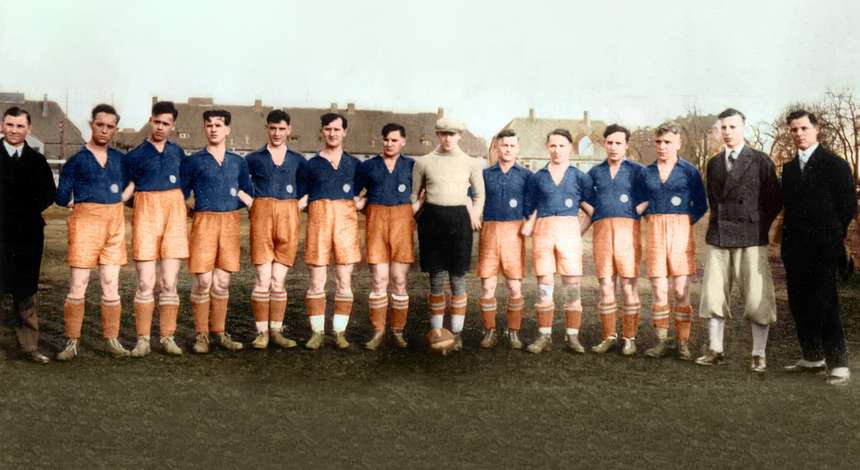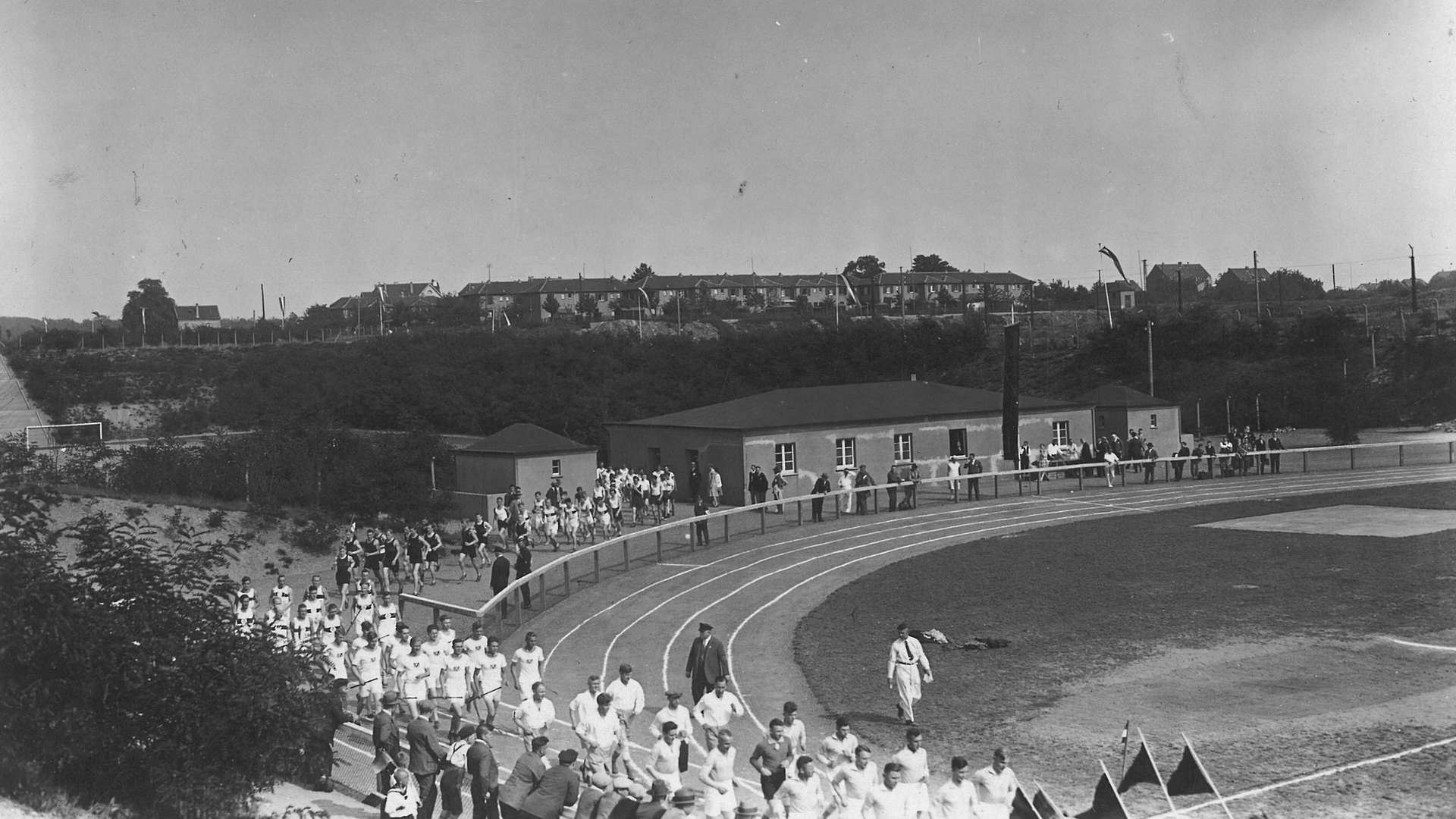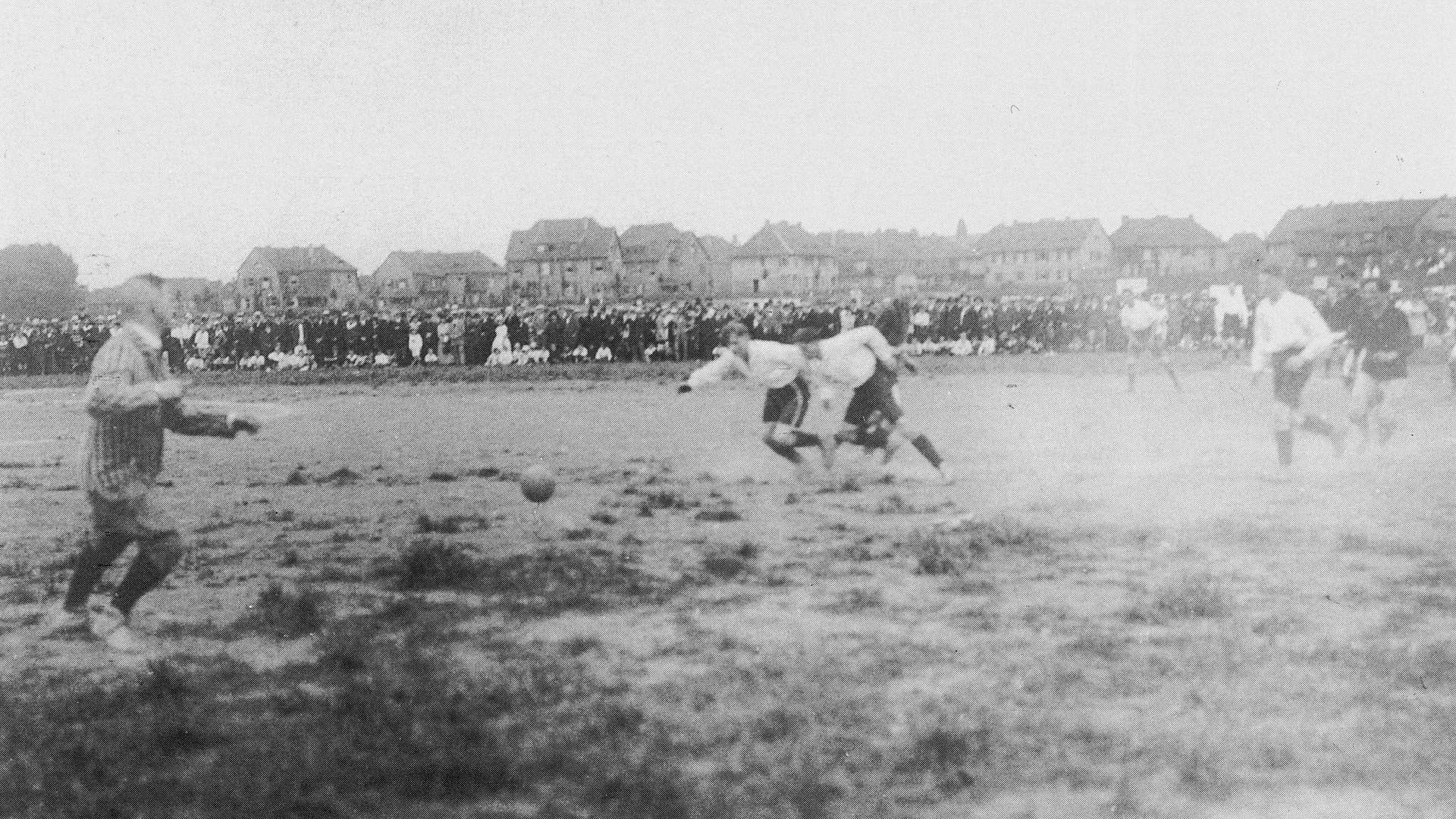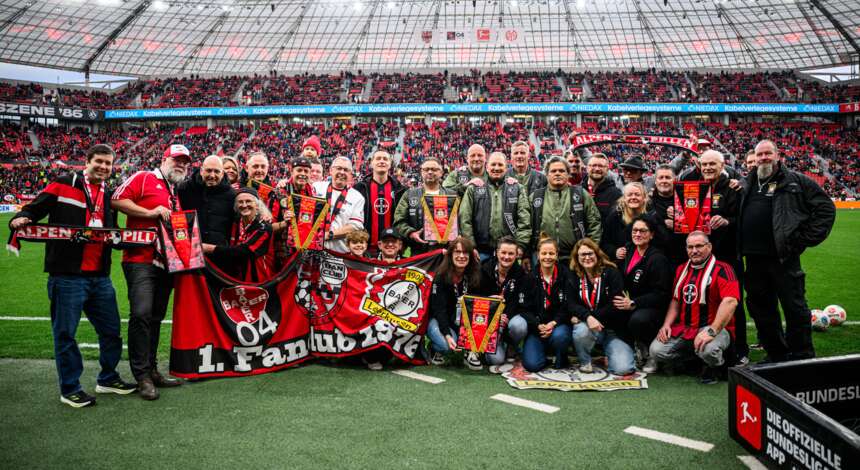
It cannot really be maintained that Leverkusen football in 1930 aroused great interest in the city and its surroundings. The Sportvereinigung Leverkusen 04 were playing in the second Rhine district league at the time, which was the fourth tier in Germany. Nevertheless: Ahead of the new season in 1930/31, the Opladener Zeitung dedicated three long paragraphs to the local top match of the weekend in their sports section – and rejoiced: "'Championship games again at last' is to be heard all over from sports afficianados in our hometown. And there is a sensation straightaway. Probably the two oldest rivals in the local group meets for a championship game at the Manfort Stadium."
TuS Manfort 1904 against SpVg. Leverkusen 04 was the "sensational" clash on matchday one with other local teams TuSpo Richrath and BV Opladen facing each other. In addition to a number of clubs from Cologne (Rodenkirchen, KBB 07, Köln 93), Leverkusen's neighbour Langenfeld were also in the third group of the second district league. Ahead of the start on 28 September 1930, the Opladener Zeitung called for “a rousing three cheers for all our clubs."
Opening win at the Manfort Stadium
Almost 500 spectators watched the 2-0 first win for the Sportvereinigung at the Manfort Stadium. Back then, the ‘visitors’ played – as from January 1929 – in blue and orange shirts. The day after, the local newspaper only dedicated 14 lines to the game under the heading 'Bergisch-Rhenish Sport'. Interested readers only learned the barest details if anything at all: "The two Leverkusen goals were scored by the outside right. The Manfort attack did not impress at all. [..] There were no errors from Leverkusen."
On the same Sunday, the Germany team under coach Otto Nerz came back from 3-0 down at half-time to secure a sensational 5-3 victory in an international against Hungary. That triumph overshadowed every other sporting event on that weekend.

Generally, national events in these troubled times kept people in suspense no less than the situation in their own backyard. The 'Golden Twenties' were in the past. Economic crisis and mass unemployment plus political extremism from the right and left heralded the decline of the Weimar Republic. The town of Leverkusen founded on 1 April 1930 had 40,000 inhabitants. In January 1931 there were 7,500 people looking for work – that was an unemployment rate of almost 19 per cent.
Football, the long established popular sport, offered many Leverkusen people a welcome diversion from the tough daily routine. And field handball players and, above all, boxers found an audience in the town. In the 1920s, the latter held club bouts in front of around 1,000 spectators, "while the footballers alongside the Dhünn (river) played in front of a small group of 150, often sullen spectators," as the club chronographer Walter Scharf put on record. In 1928, the Wiesdorf boxing and sports club joined forces with the football club FV Leverkusen 04 to form the Sportvereinigung Leverkusen 04.
At home on several pitches
The football players went into overdrive in 1930/31 to avoid disappointing their public. The key performers in the team included striker Peter ‘Fitti’ Schmitz, goalkeeper Alfred Schaumann, outside left Heinrich Odenthal and inside left Fritz Schorn. And the names Peter Schüller, Jean Breuer and Karl Peckhaus were frequently mentioned in the short match reports as goalscorers or providers. The group did not have a coach. More professional structures with a football coach were only introduced at the club from 1936 with promotion to the Lower Rhine district league.
The team went top of the table almost immediately from the start and held on to top spot until the winter break. The football year of 1930 was rounded off on Christmas Day with a ‘social game’ – as friendlies were called at the time – against another town rival Jahn Küppersteg. "The local meeting of these two clubs on the football pitch attracted a lot of spectators who wanted to complete a post-prandial walk," wrote the Opladener Zeitung. SpVg. won the game against the home club of the later Germany international Paul Janes, who was then playing for Fortuna Düsseldorf, 2-1. The fact that Leverkusen were again and again unable to play their home games at their own ground but instead as in this case at BV Wiesdorf or at the Manfort Stadium was due to flooding that often made the Dhünn pitch unplayable, particularly in winter.

At that time around the turn of the year, the headlines in the Opladener Zeitung were often dominated by other subjects. "Stormy scenes in the Prussian Parliament" was the headline in the local journal on 17 December. The first showing at the end of November of the screen adaptation of the literary classic 'All quiet on the Western front' by Erich Maria Remarque on the horror of the First World War caused a stir in Berlin at the time that the Nazis were increasingly looking to gain power. Another film had proved to be a box office hit at the time: 'The Blue Angel' with Marlene Dietrich and Emil Jannings in the main roles has its premiere in Germany on 1 April - the day Leverkusen was founded. The UFA film, one of the earliest talkies, was probably shown in the Leverkusen Cinema run by Samuel van Frank, whose sons Karl and Richard van Frank played for SpVg Leverkusen 04 for several years. The Jewish family emigrated to the Netherlands in 1933.
"Fight to the last man"
1931 started for the Leverkusen league leaders in the Rhine second district league with a game against the Kölner Ballspielverein 07 (KBV 07). In the preview of the game, the General-Anzeiger Leverkusen on 3 January adopted a militaristic tone: "Fight to the last man – that has to be the maximum for this game!" It didn't help: The Cologne side won 2-0.
But the Blue and Oranges quickly rediscovered their old form. On 18 January, they beat another team from Cologne, Köln 93, 3-2 at home. However, there was a much greater response in Leverkusen on that day from an "uplifting event at the recreational hall" (General-Anzeiger), where the Imperial Day of Foundation celebrated the establishment of the German Empire in 1871. The Leverkusen Mayor Dr Heinrich Claes, on the 60th anniversary, cheered “our German Empire, our German people and the honoured Imperial president," reported the General-Anzeiger.
Bloody clashes between Nazis and communists
But the times were getting bleaker. While Marlene Dietrich, focused on love from head to toe, rose as a new star in the world of German cinema and the football players in Leverkusen were able to hold onto top spot in the table at the end of January despite losing 2-1 to the neighbours TuSpo Richrath, fists were flying on the streets and pubs across the country. There were also bloody clashes between supporters of extremist political camps in Leverkusen. In the Leverkusen restaurant Steinacker there was fierce fighting between Nazis and communists at a meeting of the Nazi party on 10 February. "The police, with reinforcements, intervened energetically and were able to prevent further fighting and spilling of blood. Due regard must be paid." (General-Anzeiger)
At the beginning of February, there was a more peaceful time, if also hard-fought sporting competition, at the Opladen Birkenberg. Only one point separated SpVg as league leaders from third-placed BV Opladen. A "incredibly large number of spectators" did not want to miss the game, which the visitors narrowly won 1-0. Towards the end of the season, it was increasingly a head-to-head battle between Leverkusen and VfB Langenfeld.
How much football in the region was still in its infancy at the time was again evident on 28 February. Ahead of the top match between the first and second teams in the table, the General-Anzeiger prophesied: "It's about life and death." But not everybody saw it so dramatically. Not at all in the case of the referee for the game. He just didn't turn up. The teams agreed on a 'social game' with 30 minutes each way that ended all square at 1-1. The championship match was postponed to 22 March.
"The die is cast"
After beating Rodenkirchen 3-1 the week before, Leverkusen went into the decisive match for promotion a point ahead against second-placed VfB Langenfeld. For a final time, we quote from a report in the General-Anzeiger of 23 March 1931: "The top two teams yesterday produced an extremely flowing game. [...] Before the match, nobody really knew who had the better chance of winning. Now, the die is cast. The Langenfeld players were on the losing side. It is only human that they might have cast an envious look after the end of the game as the Leverkusen players received a garland to celebrate promotion. They fought bravely but were unlucky."
24 years after the foundation of the football section at TuS 04 and one year after the founding of Leverkusen, SpVg Leverkusen 04 achieved promotion to the top Rhine district league for the first time, thereby making it to the third tier of German football. 18 months later the players were able to leave the "boggy pitch" by the Dhünn River and finally move into a decent stadium at the Am Stadtpark sports ground. In the politically tumultuous years before the war, the development of Bayer football had now taken off.
Related News

Vote now for Quansah as BL ‘Rookie of the Month’ for February
The German Football League (DFL) has announced the three candidates for Bundesliga ‘Rookie of the Month’ for February. Among the candidates is Werkself player Jarell Quansah. Fans of Bayer 04 can vote for their favourite on the Bundesliga app from now until Thursday, 5 March (23:59 CET).
Show more
U.S. Fan Club Recognized During 50th Anniversary Celebrations
On a day that celebrated 50 years of official Bayer 04 fan clubs with festivities on the pitch during the match against FSV Mainz 05 on Saturday, New York-based Werkself Warriors were proudly represented on the field by co-founder Alex Kramm.
Show more
Werkself review #B04M05: ‘We lacked rhythm and intensity on the ball’
The Werkself conceded a goal at home for the first time since the beginning of January 67 minutes into the game against FSV Mainz 05 on Saturday. Jarell Quansah levelled late on for the final score of 1-1 to secure a point and avoid a first home defeat in six games. Bayer 04 were very critical of their performance after the game. The Werkself review.
Show more
Rudi recounts…: Vollborn’s March highlights
Rüdiger Vollborn has been at the club for 40 years, he holds the record number of Bundesliga appearances for the club (401) and is the only Bayer 04 player to have won both the UEFA Cup (1988) and the DFB Pokal (1993). And the Berliner stayed with the Werkself after ending his impressive playing career as he worked as a goalkeeping coach for the following nine years. Vollborn now works under the Bayer Cross as a fan liaison officer and club archivist. Since February 2021, the personalised Black and Red lexicon takes Werkself fans under the heading of 'Rudi recounts...' on a brief trip through the history of Bayer 04 every month…
Show more